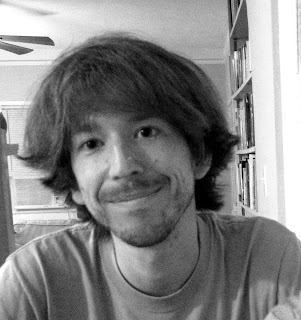Needless to say, there's nothing strictly "contemporary" about this book now, but I find it fascinating for understanding the formation of another avant-garde, or avant-gardes, in another cultural context. It's helping me to understand as well what has attracted and repelled me, in almost equal measure, in French literature and philosophy, and has provided some justification for thinking of a certain assemblage of literary qualities as "Frenchness." These qualities and associations include:
- elegance
- restraint
- purity
- rigor
- incisiveness
- playfulness
- paradox
- quantity/mathematics
- white space
 |
| Serge Gavronsky |
What there was room for in French poetry was a culture of opposition: in the wake of Surrealism and the intellectual hegemony of Sartre there came the nouveau roman and the Tel Quel group, whose anti-mimetic poetics anticipate the strategies of Language poetry in many ways. The master signifier of the 1960s moment in France was in fact écriture, of which the very phrase "Language poetry" seems roughly like a cognate. Gavronsky defines écriture succinctly as "a confrontation with one's being in the world as embodied in the text" (21): there is an ontological objective in French writing of the period that excludes or minimizes the aesthetics of textuality, even as it foregrounds the signifier (as breaking open into endless unresolvable significations, c.f. Derrida, etc.).
 |
| Derrida, etc. |
But while much was made by that generation of its refusal of sentiment (indeed, of affect--and the affectlessness of the Cartesian assemblage that I've conjured is something I want to come back to), of traditional form and of lyricism (the alexandrine, etc.), and its discovery of the body of language (if not the body in language), what's much more striking to an outside observer is the self-consistent Frenchness of it all. The most surprising and useful part of Gavronsky's introductory essay for me focuses on French education and its impact on the writers he focuses on, all of whom came of age prior to the education reforms of 1968. According to Gavronsky, this education emphasized form (literally the forming of letters in small squares in student cahiers), the rigidly "quadratic" practice of l'explication de texte that forces the student to "duplicate what had always been done and had gained an almost ahistorical status, thereby achieving the very definition of classicism" (24); the practice of writing essays with "brevity, economy and elegance" (24); and the translation of Latin into French and back again (Gavronsky mentions Francis Ponge's "penchant for Latin, a language that refused to overflow" (24, my emphasis).
One consequence of this is that French literature is literary: long before Derrida's critique of logocentrism, it seems he had all of French literary culture on board with him, because the written mot has always been privileged over spoken parole. There is no place for speech in French poetry and thus very little place for the body or the vulgar: "all those who are included in this volume," Gavronsky writes, "honor their language, play with it, control it perfectly; all avoid vulgar expressions (except Joseph Guglielmi), and when they describe violence and sexuality, the scenes are as carefully choreographed as any the marquis de Sade might have penned" (23). There seems to be no access points for these poets to the ribald medieval tradition represented by Rabelais and Villon; as Marcellin Pleynet says, theirs was a "preclassical language. This is the French that was thrown out, a language rich in virtualities" (251).
The demands of literary form for these French writers seem to be matched by the demands of responding, affirmatively or destructively, to the tradition of French literature: it's classicism all the way down. This produces a kind of walling-in of French poetry, to the point where Denis Roche can declare that "La Poésie est inadmissible d'ailleurs elle n'existe pas": Poetry is inadmissible and besides, it doesn't exist. Poetry for these poets has a quality of the invisible to it, a quasi-sacredness, and the only way forward, as Emmanuel Hocquard says, "the only way of slightly changing something, of giving it a novel touch, is through a formal problem" (235). "It's a static language!"(234). Hocquard worries in his interview that "it's become terribly literary, and that's what I mean when I say we haven't given the next generation a gift, because in fact a twenty-five-year-old writer, if he puts himself in step with what should be done, then he's already a little old man, a little old man writing literature" (238).
There seems then to be something essential and not incidental then about the assemblage of qualities that I have ascribed to French poetry above: whether it's Tel Quel or OuLiPo (which gets short shrift in Gavronsky's account in spite of his respectful treatment of Jacques Roubaud), it remains elegant, restrained, pure, rigorous, incisive, etc. The "new poetics" that Gavronsky's volume explores, circa 1994, seeks to make a place for new zones of experience in that poetry, notably the quotidian and the bodily, even speech: but still the poetry is rigorous, playful, paradoxical, etc. etc. There is a powerful restraint (or constraint) on affect in this poetry, as there is in Language poetry, and as with conceptualism the reader's experience is affectual only in the face of the absence of the affectual rhetoric that Tel Quel associated with neoromanticism and the Language poetry associated with Official Verse Culture and the workshop poem.
It is as though we were talking about a poetics of liquid nitrogen: a rhetoric that chills affect to the point that affect occurs in the reader as it were homeopathically: the pellucid or dessicated language of these poetries carries the imprint of affect the way some homeopaths have claimed that water somehow "remembers" the impact of a substance since diluted to the point where it can no longer be measured. But even this, of course, is very far from claiming that affect and emotion have no place in this poetry, or in the kinds of American poetry that I associate with it: the savagely ethical restraint of George Oppen, the muted yet parti-colored pathos of Wallace Stevens; the slyly bemused wisdom of John Ashbery; the social comedy of Leslie Scalapino. Where the ascetic meets the aesthetic: this has always been for me fertile territory: the rich virtuality of restraint, the way that experience tests language, and vice-versa. (Emily Dickinson: "If you saw a bullet hit a Bird--and he told you he was'nt shot--you might weep at his courtesy, but you would certainly doubt his word.")
Yet, though Stevens claimed that "French and English are a single language" (Adagia), English has a profligate quality, a blessed vulgarity that will never let it be Cartesian: that renders admissible to poetry what for the French writers Gavronsky interviews might only be possible in prose. What I most appreciate in flarf and conceptualism is the energy of vulgarity; flarf's is obvious, whereas conceptualism's manifests in the flamboyant hucksterism practiced by its two leading lights, Kenneth Goldsmith (last seen in the White House and on The Colbert Report) and Vanessa Place of VanessaPlace Inc. Perhaps they intend a kind of homeopathic critique of the consumerist discourses they've embedded themselves in? Including the discourse of poetry communities that, in seeking to repel them, only further enshrine them as "new poetics"?
For myself, now, I'm interested in affect as a happening, as materiality, as that which intersects my body in space and time, as what Merleau-Ponty calls "flesh." While a thousand flowers bloom--let them!--I look to Dickinson, the greatest American conceptualist, for guidance:
It would never be Common - more - I said -
Difference - had begun -Many a bitterness - had been -But that old sort - was done -
Or - if it sometime - showed - as 'twill -Opon the Downiest - morn -Such bliss - had I - for all the years -'Twould give an easier - pain -
I'd so much joy - I told it - Red -Opon my simple Cheek -I felt it publish - in my eye -'Twas needless - any speak -
I walked - as wings - my body bore -The feet - I former used -Unnecessary - now to me -Aa Boots - would be - to Birds -



